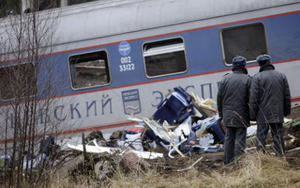Terrorism in RussiaRussia's counter terrorism woes
A recent editorial in the Washington Post illustrates Russia’s difficulties in successfully deterring terrorist attacks; the Post blasts Russian leaders citing corruption as a significant reason for their inability to successfully develop counter-terrorism policing abilities, intelligence agencies, and to secure public areas; the editorial also blames Putin’s hard line stance on the northern Caucasus region as fueling extremist movements; in 2010 terrorist attacks in the Caucasus doubled; as a stark warning, the Post reminds readers that the 2014 Winter Olympic Games is scheduled to be held on the border of the Caucuses

The 2009 Nevsky Express train attack // Source: abc.net.au
A recent editorial in the Washington Post illustrates Russia’s difficulties in successfully deterring terrorist attacks.
The identification of last week’s suicide bomber as a twenty year old man from the northern Caucasus highlights the volatile situation in the predominately Muslim republics of Chechnya, Ingushetia, and Dagestan.
These areas have increasingly turned to extremism in their quest for more autonomy from Moscow and have often resorted to violent acts of terrorism. In December of 2009, Chechen rebels bombed crowded passenger trains in Moscow, derailing one and killing twenty-six people and injuring eighty-seven in the process.
Other attacks include the deadly2004 Beslan school hostage crisis in which armed militants occupied a school and took more than 1,100 people hostage for three days.
Russian security forces stormed the building setting off a frenzied gun battle in which tanks, rockets, and other heavy weapons were used. In the end, at least 334 hostages were killed, among them 186 children.
Official Russian reports indicate that terrorist attacks in the Caucasus doubled in 2010.
The editorial blames Prime Minister Putin’s authoritarian regime for perpetuating this volatile political situation that often results in fatal attacks.
The Washington Post writes, “Mr. Putin’s autocratic form of rule and imperialist policy toward non-Russian nations has made it impossible for him to resolve — or even seriously address - the underlying problem that fuels most of the attacks.”
It goes on to say, “Russia’s brutal response, including Mr. Putin’s scorched-earth campaign in Chechnya, fueled the rise of Muslim extremist groups that have been growing steadily stronger despite nonstop counterterrorism operations.”
The editorial also blames rampant corruption in Russia for their inability to successfully form counter terrorist police forces, intelligence networks, and secure major public areas.
Putin has continued to solidify his power turning Russia into a “domestic police state,” yet Moscow has suffered eight major attacks including the destruction of two airplanes.
The Post alleges that political leaders in Russia are unwilling to shift the focus of the federal secret police and other security services “which are more skilled at protection rackets and the persecution of political dissidents than in detecting terrorist plots.”
As evidence, the Post cites the fact that in the aftermath of the most recent bombing, President Dmitry Medvedev blamed private security forces, “rather than federal officials responsible for counterterrorism.”
The editorial ends with the stark reminder that Russia is set to host the 2014 Winter Olympics in Sochi, on the edge of the Caucasus.
“The International Olympic Committee’s unwise decision to accept Russia’s bid means that athletes and governments around the world have to depend on the Putin-Medvedev regime to prevent terrorist disruption of the Games. Monday’s attack was a reminder of how risky a bet that is.”
